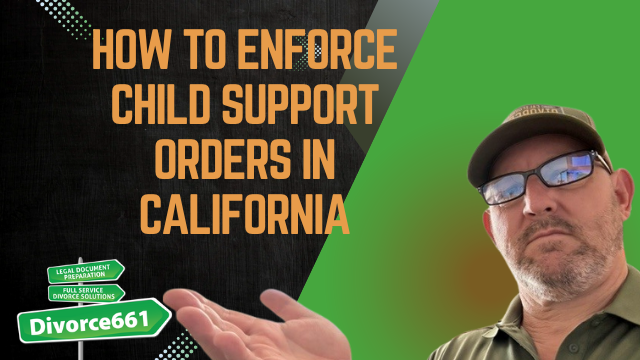How to Enforce Child Support Orders in California
I’m Tim Blankenship with Divorce661. If you’re supposed to be receiving court-ordered child support in California and the other parent isn’t paying, you don’t have to struggle alone. In this article I’ll walk you through the legal tools available to enforce a child support order, explain the typical process, and share a real client example showing how enforcement can work quickly and effectively.
Why act when child support stops?
Child support is a legal obligation designed to provide for your child’s needs. When payments stop or become inconsistent, the unpaid amounts can pile up and even accrue interest. You have the right to ask the court to step in and use enforcement measures to collect what is owed.
“If there’s a court order for support and payments have stopped or are inconsistent, you have the right to take action.”
Common enforcement tools used in California
California courts and child support agencies have several powerful methods to collect unpaid support. These include:
- Wage garnishment / wage assignment: The court can order the other parent’s employer to withhold child support directly from their paycheck and send it to the custodial parent or support agency.
- Liens on property: Unpaid support can result in a lien against real property or other assets, which can prevent sales or refinancing until the debt is resolved.
- License suspension: Driver’s licenses, professional licenses, and other licenses may be suspended for failure to pay child support.
- Interest on unpaid amounts: Unpaid support often accrues interest until it’s paid in full, increasing the total amount owed.
- Coordination with local child support agencies: Agencies have additional enforcement powers and resources that can help collect overdue payments.
How enforcement typically works: step-by-step
- Review your court order: Confirm the terms of the order—how much is due, payment schedule, and any arrears already recorded.
- File an enforcement request: Ask the court to enforce the order. This initiates the legal process and lets the court consider appropriate remedies.
- Court issues enforcement remedies: Depending on the situation, the court can order wage assignments, liens, license suspensions, or other measures.
- Implement and monitor collection: Once a wage assignment or other remedy is in place, payments should begin to arrive. Continue to track receipts and update the court or agency as needed.
- Follow up and escalate if necessary: If payments continue to lapse, you can request further court action or work with the child support agency for additional enforcement.
Real client example
We recently worked with a parent who hadn’t received support in over six months. We reviewed their court order and filed an enforcement request with the court. Within weeks, a wage assignment was issued and sent to the other parent’s employer. Payment resumed and the missed amounts began coming in on a regular basis.
“We helped them file an enforcement request, and within weeks, a wage assignment was issued to collect payments directly from the other parent’s employer.”
How I can help you
At Divorce661 I assist clients in several practical ways:
- Reviewing the existing child support order and documenting missed payments.
- Preparing and filing enforcement paperwork with the court.
- Negotiating directly with the other parent when appropriate to reach a prompt resolution.
- Coordinating with local child support agencies to pursue additional enforcement tools.
- Explaining the likely timeline and what to expect once enforcement is initiated.
Quick tips and frequently asked questions
Is wage garnishment the most effective tool?
Wage garnishment (wage assignment) is often very effective because it secures regular, automatic payments directly from the employer. However, the right tool depends on the circumstances—assets, employment status, and the other parent’s history all matter.
What if the other parent is self-employed or unemployed?
Enforcement is still possible but may require different strategies, such as placing liens on property, garnishing business accounts, or working with the child support agency to locate income sources.
Does unpaid support accrue interest?
Yes. Unpaid child support generally accrues interest until the debt is satisfied, so it’s important to act promptly to reduce the total amount owed.
Conclusion and next steps
If you’re not receiving the child support your child is legally entitled to, you have options. Filing an enforcement request with the court can trigger wage garnishments, liens, license suspensions, and other remedies that compel payment. If you’d like help reviewing your order or preparing enforcement paperwork, visit divorce661.com and schedule a free consultation. I’ll help you take the right steps to protect your child and get the support that’s required.

